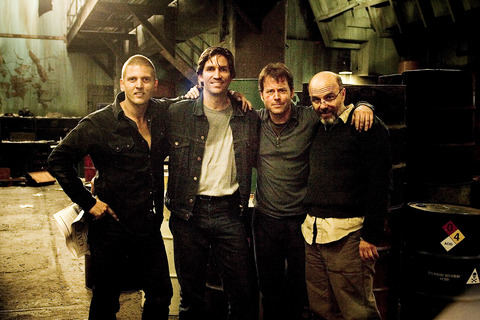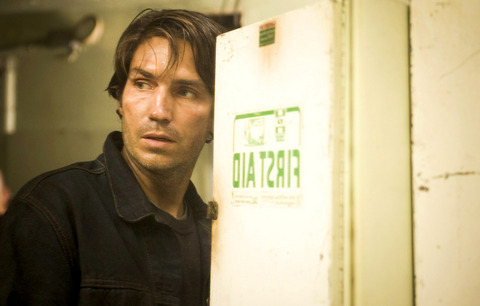"Who are you? Who the fuck are you?" are the first words spoken by the main protagonist in Unknown, a puzzling thriller but not in the way its director Simon Brand intended. In a movie about identity and forgetting you need a selective memory for the plot to work and there are too many mistakes in its conception to suspend disbelief and enjoy the twists and turns.
Much of the action is set in a dilapidated warehouse, in the desert, where Jim Caviezel's character regains consciousness to find one guy strapped to a chair and another, who has been shot, handcuffed to a railing. Two more men appear soon after. Some mysterious gas that causes retrograde amnesia has knocked them all out, so they are able to function but cannot remember who they are or what happened. Conveniently, none of the characters are carrying ID. Or else they forget to look for it. Though they have tools and two phones they are unable to get out of the warehouse.
The characters then discover that some of them are kidnappers and responsible for the situation they find themselves in while the others are victims. Since they don't know who's who they cannot trust each other. As an existential problem it's fairly interesting and similar in some aspects to Sartre's No Exit or a play by Samuel Beckett. Since they have no memories, they are clean slates. The situation, however artificially contrived, asks these questions of identity: Is it the product of experience? A result of nature? Or do you choose who you want to be at every moment?

PHOTOS COURTESY OF APPLAUSE
A better script and someone who was not a first-time director may have nibbled away at these eternal questions more effectively. Instead there is pointless action. The characters constantly fight with each other and barely a moment goes by when they are not shouting at each other. It's as if the director is afraid the audience will lose interest if there's no noise and guns going off. Instead of building on the claustrophobia of entrapment in the warehouse, a connected element is introduced and at times we follow a ritual cops-chase-kidnappers story that crosses the US.
On a positive note the B-list actors are competent and do a reasonable job. There are points where black humor elicits a few laughs from the audience. But these highlights cannot overcome the overall impression of an ill-conceived idea, so-so action sequences and disbelief. The use of flashbacks, as the characters regain their memories, was utterly predictable.
The film borrows heavily from Memento, with nods to Quentin Tarantino and Reservoir Dogs, but whereas the originals engage the imagination and are satisfying on many levels, this anemic imitation is full of cheap frills that fail to please. It's no wonder Unknown played at so few theaters in the US and quickly became a video rental shelf filler. The surprise ending is that other critics have been kinder about the movie.


The canonical shot of an East Asian city is a night skyline studded with towering apartment and office buildings, bright with neon and plastic signage, a landscape of energy and modernity. Another classic image is the same city seen from above, in which identical apartment towers march across the city, spilling out over nearby geography, like stylized soldiers colonizing new territory in a board game. Densely populated dynamic conurbations of money, technological innovation and convenience, it is hard to see the cities of East Asia as what they truly are: necropolises. Why is this? The East Asian development model, with

June 16 to June 22 The following flyer appeared on the streets of Hsinchu on June 12, 1895: “Taipei has already fallen to the Japanese barbarians, who have brought great misery to our land and people. We heard that the Japanese occupiers will tax our gardens, our houses, our bodies, and even our chickens, dogs, cows and pigs. They wear their hair wild, carve their teeth, tattoo their foreheads, wear strange clothes and speak a strange language. How can we be ruled by such people?” Posted by civilian militia leader Wu Tang-hsing (吳湯興), it was a call to arms to retake

This is a deeply unsettling period in Taiwan. Uncertainties are everywhere while everyone waits for a small army of other shoes to drop on nearly every front. During challenging times, interesting political changes can happen, yet all three major political parties are beset with scandals, strife and self-inflicted wounds. As the ruling party, the Democratic Progressive Party (DPP) is held accountable for not only the challenges to the party, but also the nation. Taiwan is geopolitically and economically under threat. Domestically, the administration is under siege by the opposition-controlled legislature and growing discontent with what opponents characterize as arrogant, autocratic

Desperate dads meet in car parks to exchange packets; exhausted parents slip it into their kids’ drinks; families wait months for prescriptions buy it “off label.” But is it worth the risk? “The first time I gave him a gummy, I thought, ‘Oh my God, have I killed him?’ He just passed out in front of the TV. That never happens.” Jen remembers giving her son, David, six, melatonin to help him sleep. She got them from a friend, a pediatrician who gave them to her own child. “It was sort of hilarious. She had half a tub of gummies,